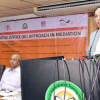No ifs or buts, DSA must be amended for everyone’s sake

Not long ago, we said in this column that no law should be iniquitous. But the Digital Security Act (DSA) is exactly that. It's clear as daylight now that the risks of this law far outweigh its benefits, if any, and any lingering doubt is but a refusal to accept the truth. The law minister's comment on DSA, unfortunately, fits into that category. As per a report by this daily, while responding to queries about the use and possible amendment of the law on Tuesday, he used the word "if" a total of four times. He said, "if necessary" the government would bring changes to the act to ensure best practice, as the law was misused to some extent.
"To some extent" is an understatement, of course. But the phrase "if necessary" takes away from what is otherwise a creditable observation coming from a minister, and weakens the prospect of a much-needed reform. Why should there still be any doubt after four long years of a law that has proven to be the single most effective instrument of human rights abuse in the country? What's left to be done but to amend or repeal it in its entirety? The only scenario in which it has any practical use now is one where it is a legal weapon to be wielded at will. For example, according to a study by the Center for Governance Studies (CGS), between January 2020 and February 2022, some 890 cases were filed under the DSA, and 206 of them were filed by members of the ruling Awami League and its affiliated organisations. More worryingly still, opposition activists and journalists are mostly implicated in them.
This shows that the main purpose of the law has been not to protect victims of cybercrimes but to intimidate social media users, particularly political activists, rights campaigners and journalists. It also shows that amending the law in light of international human rights standards is not just necessary but urgent, regardless of what the authorities say to justify their action or lack thereof. We have to admit, however, that the number of DSA cases and arrests has declined somewhat in recent times. The law minister cited a home ministry directive to make sure that DSA cases are sent to a cell comprising a high official and a legal analyst for examination before they are brought to trial. True, if done right, this will bring down the number of cases, but it is still a far cry from the reforms necessary in the law itself or how the police, judiciary and ruling party members treat cases involving voices of dissent.
We, therefore, urge the government to stop dilly-dallying and immediately amend the questionable provisions of the DSA and also ensure that no one is targeted for exercising their freedom of speech.

 For all latest news, follow The Daily Star's Google News channel.
For all latest news, follow The Daily Star's Google News channel. 







Comments